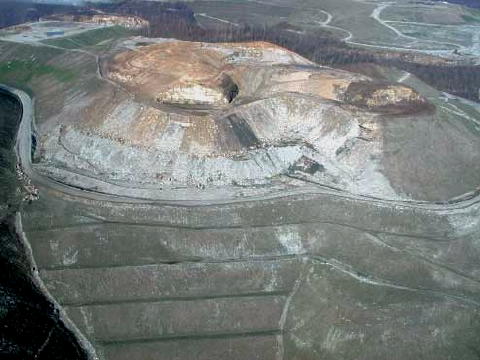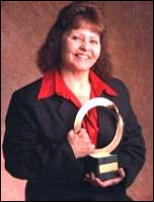COALMINER'S DAUGHTER WINS WORLD'S LARGEST ENVIRONMENTAL AWARD - The Julia Bonds Story
By Bob Weaver
 A West Virginia woman has won the "Nobel Prize" of environment for her work in the
Mountain State. Julia Bonds, a former waitress at a Pizza Hut, is a recipient of the 14th annual Goldman Environmental Prize.
She received the award Monday in San Francisco.
A West Virginia woman has won the "Nobel Prize" of environment for her work in the
Mountain State. Julia Bonds, a former waitress at a Pizza Hut, is a recipient of the 14th annual Goldman Environmental Prize.
She received the award Monday in San Francisco.
Bonds is the North American winner who has been defending her West Virginia community against the devastating practice of mountaintop removal coal mining.
In 2001, Bonds and her family became the last residents to evacuate from her own hometown of Marfork Hollow where six generations of her family had lived. Marfork had been virtually destroyed by mountaintop removal mining, which involves completely blasting off the tops of mountains so that huge machines can mine thin seams of coal. Mountaintop removal mining completely annihilates streams and forests, and causes extensive flooding and blasting damage to homes.
Bonds became a full-time activist the moment her grandson stood in a polluted local stream with his fists full of dead fish and asked, "What's wrong with these fish?"
Working 90 hours a week, Bonds has confronted long odds to stop the environmentally devastating practice of mountaintop removal coal mining in the West Virginia Appalachians. Mountaintop removal has been catastrophic for Appalachia's public health, landscape, air and waterways, and has forced the evacuation of entire towns.
When the Bush Administration successfully appealed a court ruling that mountaintop removal mining violated clean water laws, Bonds re-doubled her efforts and continues to face down the region's most powerful industry and their allies in Washington.

Mountaintop Removal
Photo courtesy of Ohio Valley Environmental Coalition
The Goldman Environmental Prize is given annually to grassroots environmental heroes from six geographic areas: Africa, Asia, Europe, Islands and Island Nations, North America, and South and Central America. (Two winners will share the Island Nations award this year.) The Prize includes a no-strings-attached award of $125,000. As the largest award of its kind, the Goldman Environmental Prize has been called the "Nobel Prize for the Environment."
Julia Bonds, 51, is a coal miner's daughter and the director of Coal River Mountain Watch. Over the past six years, Bonds has emerged as a formidable community leader against a highly destructive mining practice. In her village the coal operation contaminated drinking water and drove toxic sludge into residents' backyards. As a result, thousands of local residents have been driven out of their homes.
Coal companies routinely dump tons of mountaintop debris into nearby valleys and streams. Today, more than 1,000
miles of Appalachian headwater streams have been completely buried and 300,000 acres of the world's most diverse
temperate hardwood forests have been obliterated by so-called "valley fill."
Her dedication and success as an activist and organizer have made her one of the nation's leading community activists confronting an industry practice that has been called "strip mining on steroids," and eliminated tens of thousands of coal mining jobs by underground mining.
Bonds' primary nemesis is Massey Energy, the nation's fifth largest coal producer and the company responsible for the destruction of Marfork and many other Appalachian towns.
Richmond, Virginia-based Massey, has one of the worst environmental and safety records in the country. In 2000, it was responsible for the worst environmental disaster in Southeastern history when a slurry spill released over 250 million gallons of coal sludge in Martin County, Kentucky. Massey currently runs numerous mountaintop removal strip mines throughout Appalachia and holds a number of pending permits to mine along the Coal River Valley.
Operating from a small storefront on a shoestring budget, Bonds has scored a number of important victories despite enormous industry opposition. Foremost among them is the critical partnership she forged with the United Mine Workers Union over overweight coal trucks. Coal trucks routinely bearing twice the legal load, barrel down narrow, steep highways and through towns, endangering drivers, beating up the roads and cracking house foundations.
The monster trucks, which have now been legalized in the state, have been responsible for fourteen deaths in the past two years, including a brother and sister who were crushed to death when a coal truck forced their vehicle into another oncoming truck.
In a testament to her vigilant monitoring of mining-related violations and advocacy efforts, Bonds has also been instrumental in winning important concessions from the State Mining Board, which recently imposed a 30-day suspension on a polluting Massey mine and set tougher protections for local communities against mine blasting.
Bonds routinely receives threatening, anonymous phone calls that intensify whenever she plans a protest. She and other activists have been threatened by armed security guards on Massey's payroll when they show visitors, including journalists, sites that have been devastated by mining.
As Massey pours hundreds of thousands of dollars into an ad campaign to whitewash its image in mining calling the sites "A Field of Dreams," and other other campaigns showing a destitute family who are losing their jobs because of evil environmentalists, when in fact. job decline is directly linked to few workers needed to operate drag lines.
"Julia is lifting up a region of the U.S. often forgotten by the rest of the country," said Carolyn Johnson, staff director of the Citizens Coal Council.
"Julia has figured out a way to communicate the message of what's happening to this area. She brings in politicians and other activists to see the effects of mountaintop removal mining. Julia, under contanst threatm knows the risks of doing this work. But she knows that she is giving people living in the coalfields voice and power nationwide."
"When powerful people pursue profits at the expense of human rights and our environment, they have failed as leaders," Bonds has said. "Responsible citizens must step forward, not just to point the way, but to lead the way to a better world."
Julia Bonds carries the torch of accountability, whose flame has often been snuffed from the early days of mining in the Mountain State to the "act of God" at Buffalo Creek, to dust and debris reigning down on a West Virginia town from a processor located a few feet away.
We express our appreciation to this woman of the mountains.